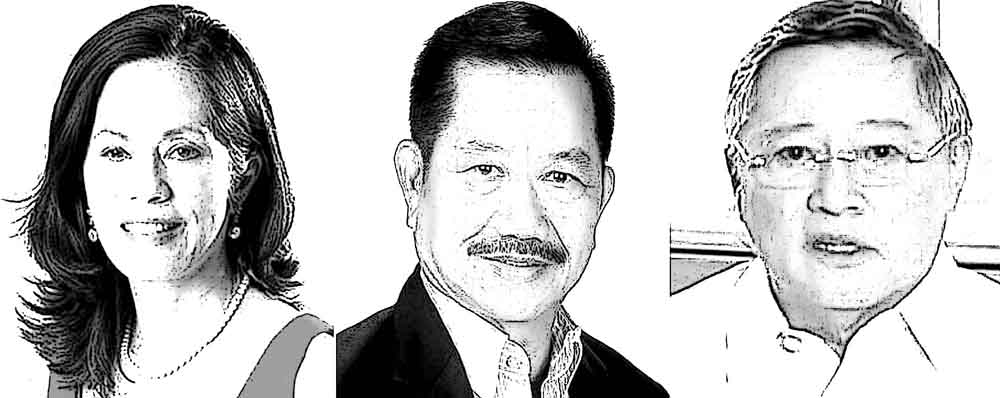 THE UNORTHODOX, TOUGH Duterte administration’s latest declared foes  have been the country’s oligarchs.
THE UNORTHODOX, TOUGH Duterte administration’s latest declared foes  have been the country’s oligarchs.
Not all rich are necessarily oligarchs. “Oligarchs” is defined by the cuss-speaking 71- year old president  as those rich who destroy the level playing field in getting government/private  contracts by bribery, dodge taxes by corrupting the BIR and the Customs and enrich themselves at the expense of the working class.
That is the reason , the former Davao city mayor never accepted any poll contribution from many of the country’s ritzy families. Most of them are taipans and some Spanish and Filipino – blood oligarchies. President Digong wanted to be his own man in running the country.
In less than two months in the Palace, Digong effectively defined he is a socialist (not a communist) , a left of center ideologue who will shatter the status quo-whose tentacle, in his mind,  deprived the masses from participating in the  all-time high GDP growth rate in the Philippines.
The first “oligarch-casualty” is former Marcos trade secretary Roberto Ongpin whose one-line gambling firm license (listed in the stock exchange as Philweb) will not be renewed by PAGCOR upon the president’s order.  That will  all but kill Philweb financially. Duterte minced no words in thrashing Ongpin as a Marcos era opportunist and a “hanger-on” to all post Marcos presidents after Cory Aquino.
Bobby Ongpin has figured in many controversial financial deals including alleged insider trading, hostile take-over and over-all exertion of undue influence in getting deals.
The well-read book “Why Nations Fail”, on the other hand, is instructive in knowing the evolution of our Philippine institutions in Duterte’s wake.
The main thesis of the book is that “inclusive political institutions” and “inclusive economic institutions” are the keys to the progress of any nation. On the other hand, “extractive political institutions” and “extractive economic institutions” are the reasons behind the failure of any nation.
As the term “inclusive” implies- these are policies of politics and economics that always redound to the benefit of the greater mass of the people. In contrast, the “extractive” ones are policies that allow people -public officials and businessmen- to extract much of the nation’s wealth for only  a few to the exclusion of the many.
The “Why Nations Fail” singles out the massive difference between the progress of South Korea and North Korea-divided by the 38th parallel- after Japan’s defeat in World War II as one example.
The “extractive” nature of North Korea’s communist government and their economic policies resulted today in the  North Koreans’ mass starvation while South Korea has 10 times more per capita income than the former and has  produced world class companies like Samsung and Hyundai.
But  South Korea started out with “extractive”( non democratic) dictatorships in Rhee and Park Hee -but used these despotic powers to shore up  economic growth through economically- enlightened subsidies, financing , level playing, and  investment liberalization . When the economy progressed later on , the government transformed itself  into a more “inclusive” and democratic one.
“Inclusive states” also always used “education” and “technology” to prosper their people. Thus, Latin America- with a vast history of extractive (starting with monarchies then into despotic leaders) policies  for a “privileged few” stagnated into mediocre performance while “inclusive” America is today the world’s richest nation which  gave birth to geniuses like Thomas Edison, Bill Gates, Steve Jobs and Warren Buffett.
There is one other caveat. For “inclusive states” to really prosper- there must also  be enough “centralization” of power so that government can keep “peace and order” and make the economic turbines pumping. Somalia, on the other hand, is identified as  an example of a state ruled by warlords fighting one another with  an” inutile ” government armed forces unable to control them-  leading the country to “chaos”.
President Duterte seems to read the writing on the wall correctly. First, he is trying to set  the nation on the path of order and discipline. Thus the hammered- fist approach versus drugs, criminality and soon illegal gambling.
He probably sees the Philippines as such as  still an “extractive” state such that the economic growth of the nation ( ie GDP) only served to enrich the rich but kept the poor at  poverty levels. Thus he singles out corruption as an adjunct to inequality.
He sees the oligarch- rich still corner government contracts, engage in monopolistic or oligopolistic practices, corrupt government people with bribery in the executive, legislative and judiciary , dodge taxes, mine lands to death  and short change the poor by one-sided “contractualization” employment arrangements.
In a sense, he likewise  sees Federalism as the answer of “extractive” Manila and wants all regions to march to the same drum to progress. Duterte senses our “political and economic” institutions are “one package of extractive bullies”  that will make the poor the last in their list of beneficiaries.
Duterte’s savage thrashing of his poster- boy oligarch “Roberto Ongpin” is one big proof that the president means business. He will dump all impediments to “inclusive” growth to the dustbin of history or hell- choose your poison.
Is real change coming? Can President survive the backlash of those whose toes he will have stepped on -in his quest for his ideal nation? For how long?
For comments: email to dejarescobingo@yahoo.com or bohol-rd@mozcom.com
